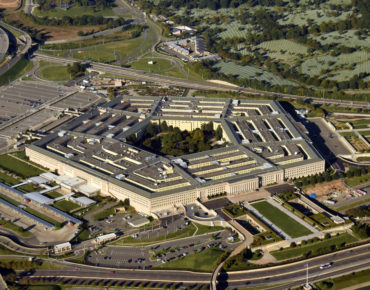The Pentagon Cancels Its Controversial $10B JEDI Cloud RFP to Re-Issue It as a Multi-Cloud Proposal

Almost six months into President Joe Biden's first term as president, the administration and the Pentagon have canceled the controversial $10 billion JEDI cloud modernization contract that was previously awarded to Microsoft Corp. in late 2019 under then-President Donald Trump.
Since the contract was awarded, its status has been up in the air. U.S. military leaders wanted to get JEDI going to bring desperately needed technology improvements and services to the agencies of the U.S. armed services, but Amazon immediately challenged the contract award as illegal, taking the matter to the courts. Amazon had charged that the Trump administration pushed to award the deal to Microsoft due in part to his personal distaste for Amazon and its CEO, Jeff Bezos.
The JEDI (Joint Enterprise Defense Infrastructure) cloud Request for Proposal (RFP) will now be re-issued, according to the Pentagon, with specific language calling for the next contract specifications to use a multi-cloud approach, as is the practice of most enterprises today.
In a July 6 statement, the U.S. Department of Defense (DOD) said the original JEDI contract and RFP was canceled to meet new evolving requirements for cloud technologies, including a critical multi-cloud approach rather than a single cloud provider as stipulated in the original RFP. The original contract approved in 2019 no longer meets the DOD's needs, the statement reported.
"The Department continues to have unmet cloud capability gaps for enterprise-wide, commercial cloud services at all three classification levels that work at the tactical edge, at scale -- these needs have only advanced in recent years with efforts such as Joint All Domain Command and Control (JADC2) and the Artificial Intelligence and Data Acceleration (ADA) initiative," the Pentagon said in a press release.
"JEDI was developed at a time when the Department’s needs were different and both the cloud service providers technology and our cloud conversancy was less mature," John Sherman, acting DOD Chief Information Officer, said in a statement. "In light of new initiatives like JADC2 and AI and Data Acceleration (ADA), the evolution of the cloud ecosystem within DOD, and changes in user requirements to leverage multiple cloud environments to execute mission, our landscape has advanced and a new way-ahead is warranted to achieve dominance in both traditional and non-traditional warfighting domains."
The new contract RFP will be known as The Joint Warfighter Cloud Capability (JWCC) RFP, which will be a multi-cloud/multi-vendor Indefinite Delivery-Indefinite Quantity (IDIQ) contract. The JWCC will replace the now out-of-date JEDI contract specifications.
 To fulfill this RFP, the DOD "intends to seek proposals from a limited number of sources, namely the Microsoft Corp. and Amazon Web Services as available market research indicates that these two vendors are the only cloud service providers (CSPs) capable of meeting the department’s requirements," the agency said. The DOD will, however, also conduct research to determine whether any other U.S.-based hyperscale CSPs can also meet the DOD’s requirements and should be included in the contract RFP. That could include companies such as Oracle Corp., Google Cloud and IBM Cloud.
To fulfill this RFP, the DOD "intends to seek proposals from a limited number of sources, namely the Microsoft Corp. and Amazon Web Services as available market research indicates that these two vendors are the only cloud service providers (CSPs) capable of meeting the department’s requirements," the agency said. The DOD will, however, also conduct research to determine whether any other U.S.-based hyperscale CSPs can also meet the DOD’s requirements and should be included in the contract RFP. That could include companies such as Oracle Corp., Google Cloud and IBM Cloud.
In a July 6 story by Reuters, Republican Senator Chuck Grassley of Iowa praised the Pentagon's decision. "The JEDI contract has been burdened by potential conflicts of interest, size, needless delays and its single awardee structure," Grassley said. A fresh review process "will afford the program an opportunity for greater public trust and confidence," Grassley added.
Reactions from AWS and Microsoft
In a statement sent to EnterpriseAI, an AWS spokesperson said the company understands and agrees with the DOD's decision to cancel the original JEDI contract and move to a more appropriate and up-to-date multi-cloud and multi-vendor approach.
“Unfortunately, the contract award was not based on the merits of the proposals and instead was the result of outside influence that has no place in government procurement," said the AWS spokesperson. "Our commitment to supporting our nation’s military and ensuring that our warfighters and defense partners have access to the best technology at the best price is stronger than ever. We look forward to continuing to support the DOD’s modernization efforts and building solutions that help accomplish their critical missions.”
In a July 6 post on the Official Microsoft Blog, Toni Townes-Whitley, president of Microsoft's U.S. regulated industries division, wrote that the company's commitment to the DOD remains steadfast.
"We understand the DOD’s rationale, and we support them and every military member who needs the mission-critical 21st century technology JEDI would have provided," wrote Townes-Whitley. "The DOD faced a difficult choice: Continue with what could be a years-long litigation battle or find another path forward. The security of the United States is more important than any single contract, and we know that Microsoft will do well when the nation does well. Because the security of the United States through the provision of critical technology upgrades is more important that any single contract, we respect and accept DOD’s decision to move forward on a different path to secure mission-critical technology."
Analysts See DOD JEDI Cancelation as the Right Move
Several industry analysts said the Pentagon's decision was a good call.
"A new administration coming into a contested award where it looked like the executive branch may have abused its power is left with little choice if they want to avoid defending that executive branch’s behavior," said Rob Enderle, principal analyst with Enderle Group. "In government contracts, you want to avoid even the appearance of conflicts of interest and self-dealing. In addition, a new administration is going to have different experts, and more will typically be known about any large-scale goal as time goes by. Enough time has passed, and the new administration has different experts, suggesting that this be redone to assure the project’s success."
Charles King, principal analyst with Pund-IT Inc., said the Pentagon's decision should not have surprised anyone.
"They are technically correct in noting that the specs of the original proposal are now out of date," said King. "However, another issue that canceling the project should address is preventing past and current DOD officials from embarrassing themselves in court."
Perhaps the most important part of redoing the RFP process and updating the specifications of what is needed is that "working with multiple vendors means that the DOD will effectively be embracing hybrid multi-cloud," said King. "That is a far better outcome than the original single provider approach."
Another analyst, Daniel Newman, the CEO of Futurum Research, told EnterpriseAI that the original JEDI contract "has been surrounded with controversy almost since the onset, and the speculation that this could happen has been floating almost from the moment it was awarded to Microsoft." Newman said he expected that the JEDI contract would be subject to intense post-award scrutiny and that the most likely outcome would be a shared contract where the federal government would wind up utilizing the services of both AWS and Microsoft to both diversify its options and maximize the resources that both can provide.
"While this is big news, in the end I expect both Microsoft and AWS to continue to be winners in federal contracting and the revenues aren't gone for Microsoft but will likely be realized in a different time period with modified conditions from the original award," said Newman.
Bob O'Donnell, the president and chief analyst at TECHnalysis Research, LLC, said the DOD's decision to cancel the original JEDI contract makes complete sense. "For something as critical as their cloud computing efforts, they should have multiple partners to spread the responsibility as well as the risk," he said.
"There is a reason most companies are adopting multi-cloud strategies, because it provides a critical backup in the event that one provider goes down—not to mention the potential price benefits of playing the different companies off of each other," said O'Donnell. "Finally, from a security perspective, it makes more sense for DOD to have their cloud computing efforts in multiple places, instead of creating a single target onto which potential enemies and other criminals could focus all of their efforts.”
In March of 2020, the DOD first agreed to revisit the JEDI contract award to Microsoft after Amazon filed its objections to the way the deal was handled. The move came after a federal judge refereeing a protest filed by AWS indicated that the cloud giant was likely to succeed in making its case on technical and legal grounds.
A federal court had blocked the JEDI rollout in February of 2020 in response to an AWS discovery motion alleging political interference and resulting bias in the contract award. It also sought to depose then-President Trump and DOD officials. AWS had alleged evaluation errors and bias in six of eight categories used in selecting a single JEDI contractor.














